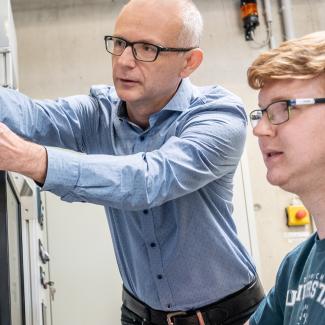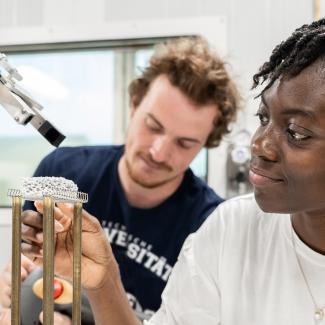Process Engineering & Chemical Engineering
Process engineering and chemical engineering ("VTC" for short) deal with all processes in which substances are changed in terms of composition, type or properties. They use mechanical, thermal, chemical or biological processes.
The electronic materials in your mobile phone, tablet, laptop or PC were obtained from raw materials using process engineering processes. The plastics, paints, varnishes and foams that surround you have been produced from basic chemicals using technical processes. The food and luxury foods you eat and the pharmaceuticals you consume are produced from natural substances using technical processes. Hydrogen, the energy carrier of the future, is produced by means of technical processes. The greenhouse gas carbon dioxide is "captured" by means of technical processes and deposited in landfills or converted into chemicals, fuels and products by means of technical processes. Municipal and industrial residues (waste), wastewater and exhaust air streams are treated, purified and/or recycled using process engineering processes. This list could go on and on. You will have realised by now that the VTC represents very relevant future technologies for our supply of a healthy environment, energy, basic chemicals and food and that the areas of application for a graduate of the VTC are almost endless.
The first four semesters of the VTC Bachelor's degree course are therefore designed to enable you to quickly familiarise yourself with new tasks with varying requirements based on a very comprehensive basic education (in science and engineering). You will not only familiarise yourself with these scientific and engineering fundamentals, but also learn to understand them. This small but subtle difference is crucial for you to be able to transfer and apply your knowledge to new challenges later on and to assess your ideas and the ideas of others in terms of their usefulness and feasibility.
From the fourth semester onwards, you will increasingly focus on the basic modules of VTC (mechanical VT, chemical VT, thermal VT and energy VT) and process simulation. To a limited extent (after all, the Bachelor's degree only lasts 7 semesters), you can develop your interests by choosing your coursework topic, the Bachelor's thesis topic and by choosing a completely free elective module and by choosing a few modules from a module catalogue.
In the interests of honesty, it must be said that there is hardly any time left in the 7-semester Bachelor's degree programme for in-depth or special VTC content. The Bachelor VTC programme therefore hardly goes beyond the basics of VTC. Of course, you can also acquire the in-depth and specialised knowledge with greater consideration of your interests in a subsequent VTC Master's programme, which is also offered at TUBAF.
If you are now wondering whether a continuous 10-semester VTC diploma programme or a 7-semester Bachelor's VTC followed by a 3-semester Master's VTC is more suitable for you, then either follow our recommendation below or simply give us a call. We will be happy to discuss your specific case with you.
The Dean of Studies' recommendation is:
The VTC degree programme is recommended for all those who already know before starting their studies that they want to study VTC and are looking for a comprehensive university education. Yes, with the Bachelor's degree programme followed by the Master's degree programme, you can achieve the virtually identical goal in the same amount of time (10 semesters in total), but you have more strict deadlines (you can only start the Master's degree programme once you have passed the Bachelor's degree) and are less flexible in terms of time (a possible semester abroad is more difficult to accommodate; the sequence of modules to be attended in the Bachelor's and Master's degree programmes is strictly prescribed due to the short duration of each programme). If this has sparked your interest in the VTC degree programme, then take a look at the profile of this degree programme.
The Bachelor's degree programme VTC is recommended for all those who have not yet decided on VTC before starting their studies and are still flirting with the other engineering degree programmes at our faculty. Strictly speaking, the VTC Bachelor's degree programme is not a degree programme in its own right, but a part of our Bachelor's degree programme in Engineering. You should therefore take a look at the specification of our Bachelor's degree programme in Engineering.
So if you decide on the Bachelor's degree programme in VTC, you are actually opting for the Bachelor's degree programme in Engineering, in which you then decide on the sub-degree programme that suits you at the end of the third semester, which could be VTC. In this way, you remain flexible for the time being and, if you continue with the VTC Master's degree programme after the VTC Bachelor's degree programme, you will achieve a virtually identical goal with only a few compromises compared to the Diplom degree programme. The compromises are, as described above, more strict deadlines (you can only start the Master's programme once you have passed your Bachelor's degree) and less flexibility in terms of time (it is more difficult to fit in a possible semester abroad; the sequence of modules to be attended in the Bachelor's and Master's programmes is strictly prescribed due to the short duration of each programme).
What else needs to be said:
When we developed the Bachelor's degree programme in Engineering together with dedicated students at our faculty in 2020, the following was very important to us in terms of studyability:
- relatively few exams per examination period: you don't have to rush from exam to exam! You have the time and opportunity to really get to grips with the material and learn it for long-term memory
- Early contact (from the second semester) with modules with engineering applications and links to current research work: This keeps your motivation for engineering studies at a high level even during the otherwise long "dry spell" of basic science and engineering training (first four semesters)
- individual choices by selecting compulsory elective modules from a predetermined module catalogue and by choosing free elective modules: You can develop flexibly according to your engineering interests and also have the opportunity to think outside the box
- You will gain practical and research experience in the basic internship, during two specialist excursions, a student research project, a 14-week specialist internship and a Bachelor's thesis
- In addition, training in the specialist language of English and introductory business administration provide you with the basis, to become successful in an international environment
We, the study committee, are convinced that with the Bachelor's degree programme in Engineering, we are providing a flexible yet rigorous undergraduate degree programme that will prepare you excellently for future job profiles in advanced engineering degree programmes in industry, business and science, taking your interests into account.
We will be happy to support you. If you have any questions about the programme, please give us a call.
- Faculty
-
Faculty of Mechanical, Process and Energy Engineering (Faculty 4)
- Degree
-
Bachelor of Science (B. Sc.)
- Standard period of study
-
7 Semester
- Part-time possible
-
No
- Start of studies
-
Winter semesterSummer semester
- Admission requirement
-
Abitur or subject-specific higher education entrance qualification or an entrance qualification recognised as equivalent
Language requirement
- Application: with at least B1 level German
- Admission to the degree program: with C1 level German (e.g. DSH-2)
- language courses and DSH exam at TUBAF
- Course language
-
German
Research and development as well as project planning, operation and maintenance of process engineering equipment and systems, including in the chemical industry, energy industry, battery (recycling) industry, ceramics, glass and building materials industry, mining and processing, wastewater treatment, waste disposal and treatment, air pollution control, food industry, heating and air conditioning technology, biotechnology, mechanical and plant engineering
In addition to the economy, graduates are also employed in the following professional fields:
- Management and logistics
- Engineering offices
- Teaching and research: e.g. university, Fraunhofer Society, Max Planck Institutes
- Public sector
- Engineering offices
- Teaching and research: e.g. universities, Fraunhofer Society, Max Planck Institutes
- Public sector.e.g. university, Fraunhofer Society, Max Planck Institutes
- Public service: e.g. authorities, TÜV, local authorities, utilities and waste disposal companies, municipal utilities
- Economic and professional associations, consultancy
- Freelance work: e.g. appraiser, industrial consultant, patent attorney
Why study Process Engineering and Chemical Engineering at TUBAF?
- Because the needs of the students were strongly taken into account when creating the degree programme (manageable number of examinations, stringent study options, elective options, application and research relevance at an early stage of the degree programme)
- Because you value short distances and personal contact with the lecturers
- Because you would like to benefit from the lecturers' international contacts and be supported in organising a semester abroad or your Bachelor's thesis at an international research institution (we are happy to arrange this)
- . (we will be happy to put you in touch)
- Because you may want to work as a paid research assistant on current research projects and thus gain insights into current research (we need your support for our research projects)
- Because TUBAF has excellent contacts with funding organisations that support our students in the form of grants:inside that support our students in the form of scholarships (scholarship chances are quite high!)
- Because we prioritise our students, precisely because we are a small but very research-intensive university. Our graduates are also our doctoral students of tomorrow, with whom we are happy to research the challenges of the future together!
- Because life (including housing) in Freiberg is not as overpriced as in some other university towns.
- ...
Suitable further study programmes
Master's degree in Process Engineering
Master's degree in Environmental Engineering
Diploma postgraduate programme in Environmental Process Engineering
Interests and skills you should bring with you
Basic understanding of maths and science subjects. No advanced course level required. Much more important are an interest in process engineering/chemical engineering, enthusiasm for new things, perseverance and some self-discipline and ambition.
A 6-week basic internship is required for this degree programme (30 working days). Completion or partial completion before the degree programme (after the Abitur) is recommended. The internship can also be completed during the degree programme. The requirements for the basic internship can be found in the adjacent download. Dr Dög will be happy to answer any questions you may have (see the box on the right "Specialist advice").
Introduction to the degree programme
Engineering degree programme with 6 sub-degree programmes
Fascination with technology - study engineering in Freiberg


